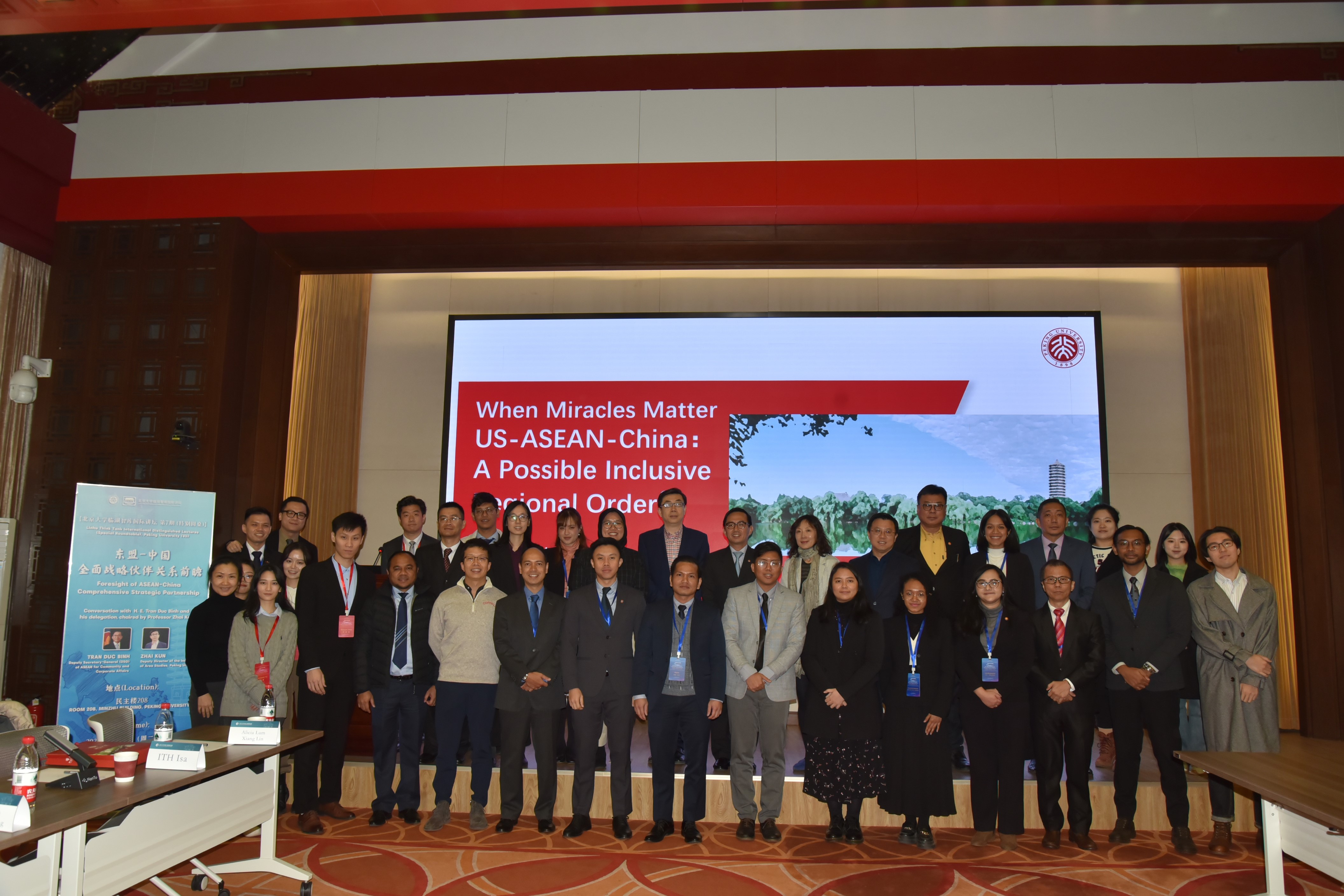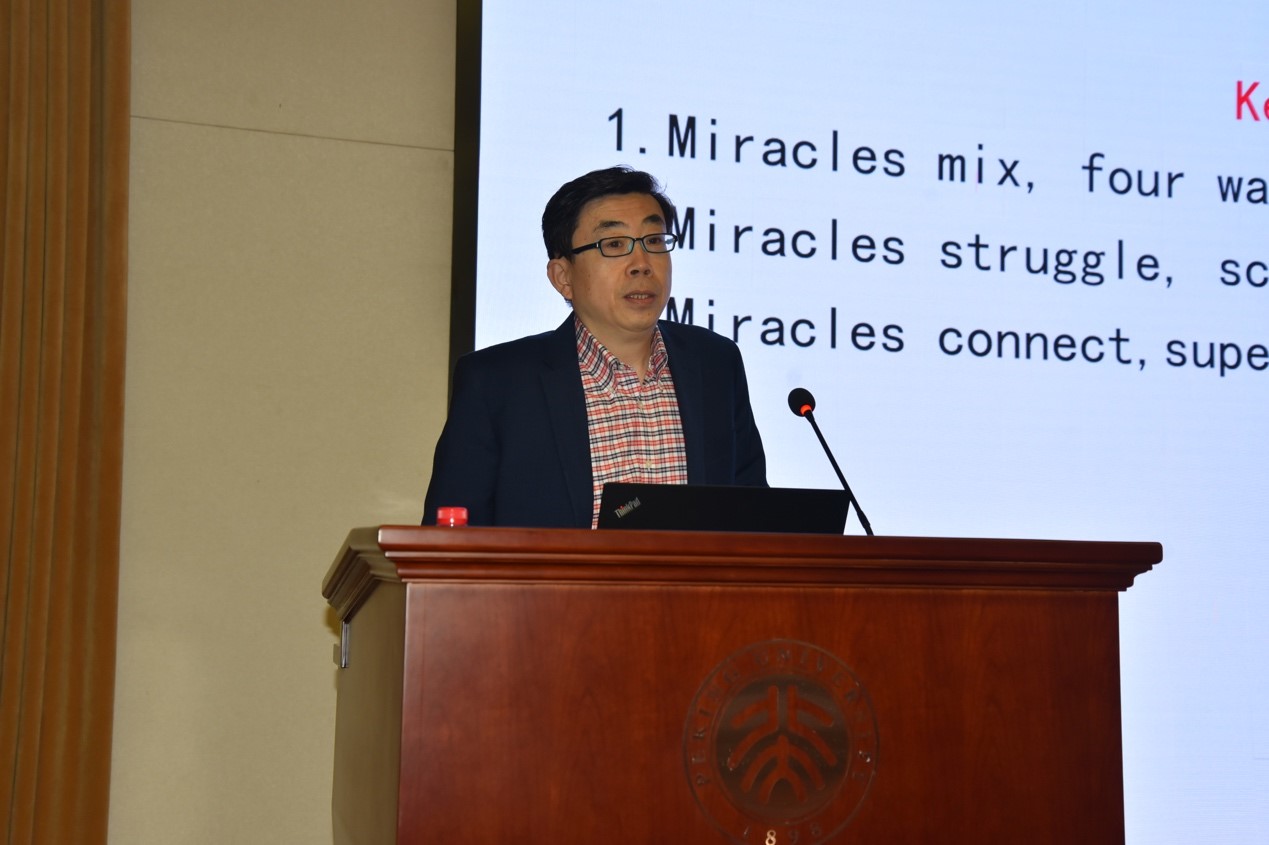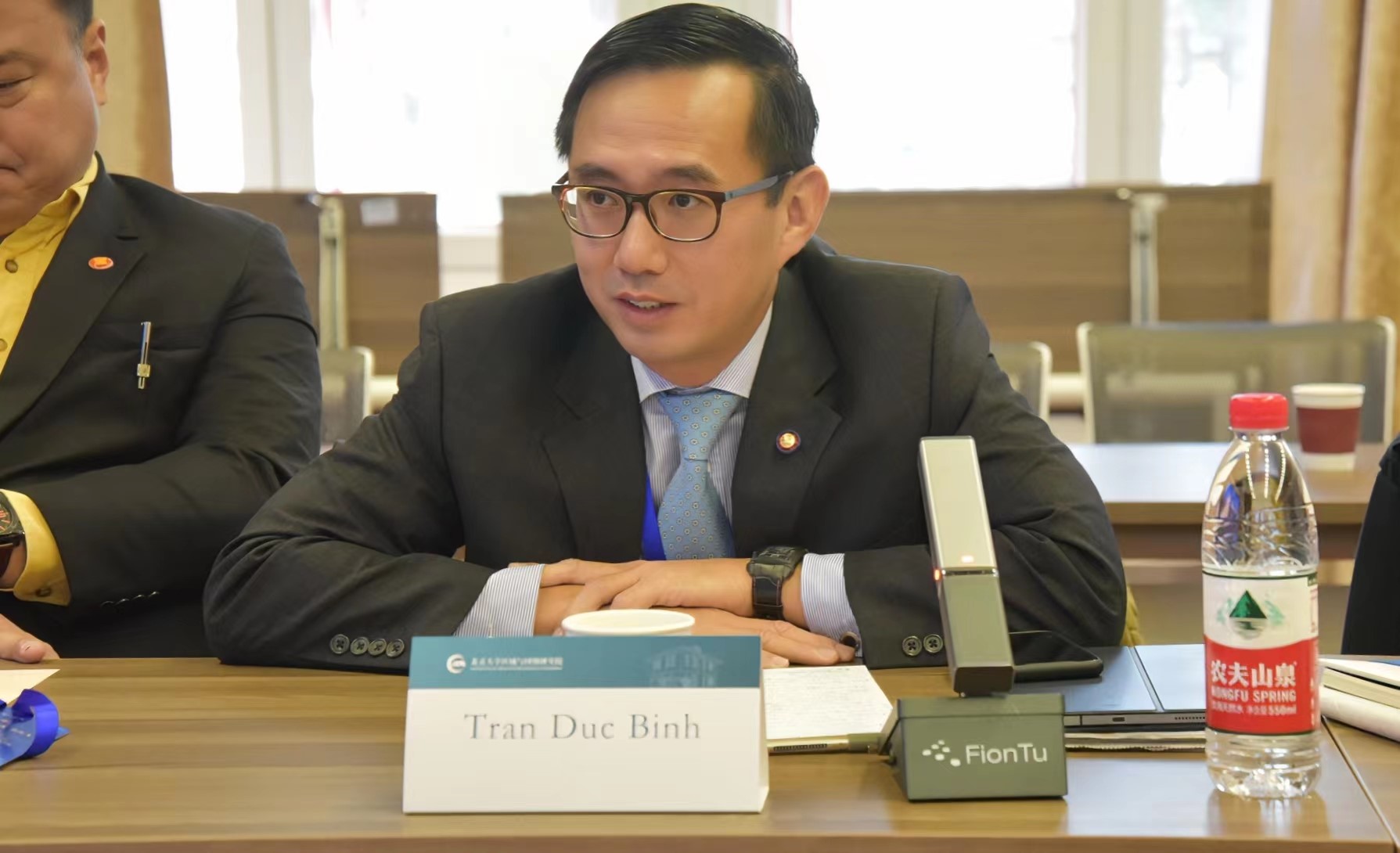
The Institute of Area Studies, Peking University (PKUIAS) held the 10th lecture of its Adventus Amicorum series on November 7, 2023. Tran Duc Binh, the current Deputy Secretary-General of ASEAN, and 21 members of Binh’s delegation were invited to the forum. Prof. Zhai Kun, deputy director of PKUIAS, shared his views on the topic of “When Miracles Matter — US-ASEAN-China: A Possible Inclusive Regional Order?” The lecture was introduced by Kong Tao, a senior research fellow at the Institute of Digital Finance and associate research fellow at PKU’s Institute of Social Science Surveys. Wang Dong, deputy director of the Office of Humanities and Social Sciences; and Xie Kankan, assistant professor at the School of Foreign Languages as well as PhD students from PKUIAS participated in the discussion.

First, Prof. Zhai Kun discussed in detail the four “miracles” that occurred in Southeast Asia after World War II. These miracles included the hegemonic system established by the US since 1945, the birth of the ASEAN miracle after 1967, the rise of China after 1979, and the establishment of a vast zone of peace and development between China and ASEAN beginning in 1991. These miracles were intertwined and mutually reinforcing, and relied heavily on the power of the US and the US–dominated international system. However, over time, entering the third decade of the 21st century, obstacles to globalization, the US–China strategic rivalry, the COVID-19 pandemic, and the Russian-Ukrainian conflict have exacerbated the complexities and risks of shaping the regional order. In Southeast Asia, the strategic competition between China and the US covers a number of key areas, including the balance of power, security issues, regional economic security, development models, and Generation Z issues. By comparing two historic documents, the Joint Vision Statement of the ASEAN–US Special Summit, released in May 2022, and the Joint Statement of the ASEAN–China Special Summit Commemorating the 30th Anniversary of the ASEAN–China Dialogue Relationship, released in November 2021, Prof. Zhai Kun highlighted the prominence of ASEAN in China’s diplomacy as well as the advent of the new ASEAN+ Comprehensive Strategic Partnership era. In addition, Prof. Zhai Kun emphasized that ASEAN is expected to play the role of a super-connector and participate in the construction of a regional order. He discussed a lot of representative regional structures, including China’s Belt and Road initiative, the US strategy in the Asia-Pacific to Indo-Pacific region, and ASEAN’s regional cooperation in East Asia, particularly in the ASEAN Outlook for the Indo-Pacific (AOIP), which is inclusive and compatible, bringing China, the US, and other major powers under a common umbrella, and other major powers into a common but competing circle of partners. Finally, Prof. Zhai Kun made the point that ASEAN is emerging as a middle ground and explored the potential for ASEAN cooperation with the US and China that could be realized under the AOIP framework, while also highlighting the active role of China and ASEAN in promoting regional norms-setting.
Tran Duc Binh then highlighted the fruitful and constructive development of the ASEAN–China partnership over the past 32 years, and the prospects for future cooperation between China and ASEAN, not only within the framework of the US-China partnership, but also in the areas of trade, investment, and people-to-people exchanges. It is important that China and ASEAN continue to strengthen their cooperation, including messaging, mutual communication, policy coordination and the expression of concerns. Such cooperation is not limited to ASEAN and China, but should be extended to various ASEAN-led cooperation frameworks, including high-level forums, national summits and cooperation projects in various areas, he said. Binh emphasized the significance of the current topic of discussion. In particular, it was important for how ASEAN and China can collectively address the challenging international environment and build an inclusive regional framework to ensure that we all benefit in the future, he said.

Several members of the delegation then explained in detail the mechanism by which ASEAN operates. In particular, they emphasized that ASEAN is an organization that focuses on cooperation, inclusiveness and openness, and that it has adopted a series of activities and mechanisms, including the Plus mechanism, the ASEAN Regional Forum (ARF) and the ASEAN Summit. These mechanisms not only play a critical role within the ASEAN region, but also enable ASEAN to act as an intermediary and provide an important platform for promoting cooperation and dialogue among the parties. Xie Kankan noted that ASEAN was not the same as it was 30 years ago, and that it was playing an increasingly important role in international affairs, expanding its political, economic and cultural influence, and contributing positively to the stability and prosperity of the Asia-Pacific region and the world. With the passage of time, we could expect ASEAN to continue to play its pivotal role in shaping the international order and promoting global cooperation, she said. Wang Dong then presented China’s views on the international order. He hoped that in the future ASEAN could play an active role in promoting the international order in a more just and rational direction.
In the final discussion session, Kong Tao delved into the impact and fundamental changes of digital payments globally, highlighting their widespread use and importance. Participants actively explored the challenges facing the regulation of digital payments, including the balance between innovation and stability, consumer protection and privacy, and maintaining the competitiveness and dynamism of the industry. She also shared China’s experience in the field of digital payments, which could be useful for ASEAN countries to explore. In addition, in response to a question from a PhD student on the development of ASEAN’s health and wellness sector in the post-pandemic era, the mission representative pointed out that ASEAN is actively creating a branch specialized in responding to emerging infectious diseases and public health emergencies, in order to better cope with common pandemic issues. In the future, ASEAN plans to strengthen cooperation with China and other international partners to focus not only on emerging infectious diseases but also on chronic diseases to better address global health challenges.


